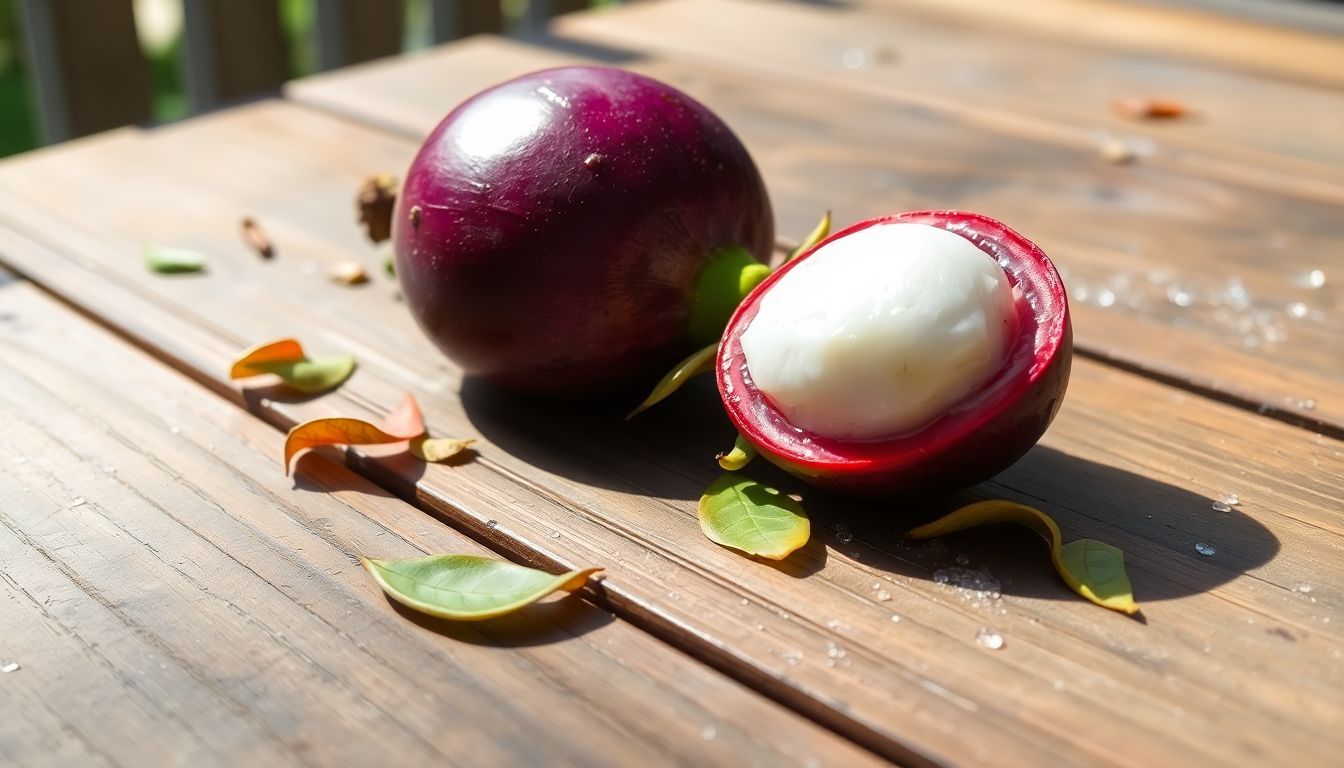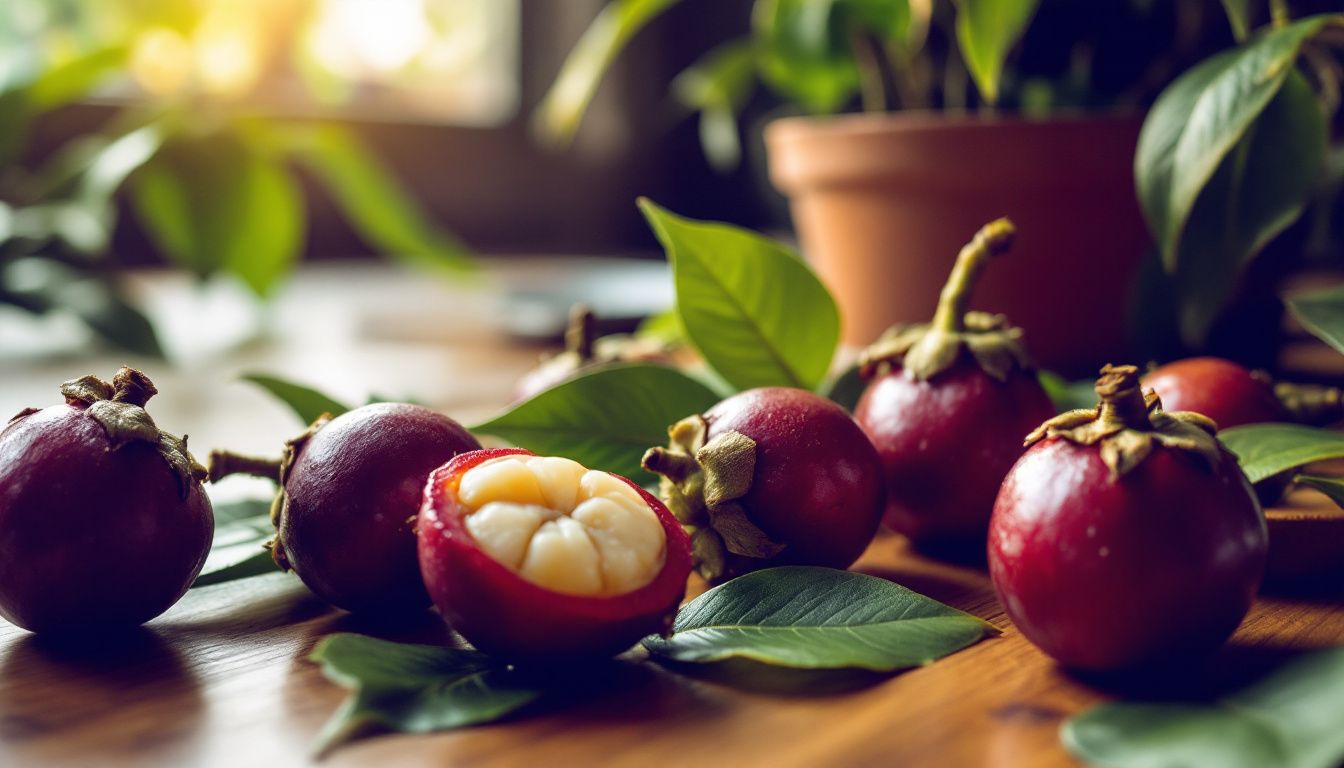Struggling to find natural ways to boost your health? Mangosteen, a tropical fruit from Southeast Asia, is packed with nutrients like vitamin C and antioxidants. This article breaks down how it may help with inflammation, blood sugar control, and more.
Thank you for reading this post, don't forget to subscribe!Keep reading—you might want mangosteen in your diet!
Key Takeaways
- Mangosteen is rich in Vitamin C, antioxidants (like xanthones), and fiber. These nutrients support immune health, fight free radicals, and improve digestion.
- Studies show mangosteen helps lower inflammation markers like CRP by 46% and boosts antioxidant levels by 15%. This may benefit people with chronic diseases like arthritis or diabetes.
- Regular intake of mangosteen may help manage blood sugar, reduce insulin resistance, and promote heart health by lowering LDL cholesterol while improving HDL levels.
- The fruit supports skin health by boosting collagen production with Vitamin C and reducing aging signs through antioxidants. A study found daily mangosteen extract improved skin elasticity over three months.
- Though promising for cancer prevention and mental wellness due to its anti-inflammatory effects on cells, more research is needed to confirm these benefits fully.
Nutritional Profile of Mangosteen
Mangosteen is packed with nutrients that support overall health. It contains vitamins, minerals, and powerful antioxidants that protect your body from damage caused by free radicals.
Vitamins and minerals
Canned mangosteen, drained and in syrup, gives 6% of the daily value (DV) for Vitamin C. Vitamin C helps fight free radicals and boosts the immune system. It also supports wound healing and maintains healthy skin.
This fruit contains 15% DV of Copper and B9 (Folate). Folate aids cell production, while copper improves heart health by supporting red blood cells. Magnesium makes up 6% DV and keeps muscles working well.
Next, explore its antioxidant levels!
Antioxidant levels
Mangosteen contains powerful antioxidants like Vitamin C and xanthones. These protect the body from free radicals, which can cause damage to cells. A study in 2015 found that drinking a mangosteen-based drink for 30 days increased antioxidant levels by 15%.
This shows how effective mangosteen is at boosting the body’s defenses.
Manganese in mangosteen also helps fight oxidative stress. Oxidative stress leads to aging and chronic diseases like heart disease or type 2 diabetes. Antioxidants support better health by reducing these risks.
Adding fresh mangosteen or supplements to your diet can help improve overall antioxidant activity in human plasma.
Health Benefits of Mangosteen
Mangosteen is packed with nutrients that can help the body fight inflammation and maintain better health. Its natural compounds may also protect cells from damage caused by harmful molecules.
Anti-inflammatory properties
Xanthones in mangosteen help fight inflammation. These natural compounds lower C-reactive protein (CRP) levels—a key marker of inflammation. A 2015 study showed CRP levels dropped by 46% after regular consumption.
This can benefit those with chronic diseases linked to high inflammation, like arthritis or heart issues.
Its anti-inflammatory effects also target gum health. The fruit’s antibacterial properties reduce swelling caused by conditions like periodontal disease. Mangosteen helps calm the body’s inflammatory response, promoting better overall health while easing discomfort from such problems.
Anticancer effects
Chronic inflammation plays a key role in cancer development. Mangosteen contains xanthones, which are powerful compounds that may fight this process. Test-tube studies show xanthones can stop the growth of cancer cells in breast, stomach, and lung tissues.
Animal research suggests these compounds might slow colon and breast cancer progression. Diets rich in fruits like mangosteen link to lower cancer rates in population studies. The antioxidants found in mangosteen also help reduce oxidative stress—another factor tied to tumor growth.
Supports blood sugar control
Mangosteen may help manage blood sugar levels. Xanthones found in this fruit improve insulin sensitivity, making it easier for your body to use glucose. In a 26-week study, women with obesity who took 400 mg of mangosteen extract daily had reduced insulin resistance.
The high fiber content in fresh mangosteen also stabilizes blood sugar by slowing digestion. This can prevent sudden spikes or drops and supports better diabetes control. Including mangosteen in a balanced diet could benefit those dealing with type 2 diabetes or insulin resistance issues.
Boosts immune system health
Loaded with vitamin C and dietary fiber, mangosteen helps defend the body against illnesses. Vitamin C promotes antibody production and strengthens immune cells. In a 30-day study with 59 people, consuming mangosteen reduced inflammation markers and increased healthy immune cells.
Its antioxidants fight free radicals, protecting the body from damage. These compounds support quicker wound healing and lower oxidative stress. Regular intake may improve overall defense against infections or chronic diseases like inflammatory conditions.
Promotes healthy skin
Healthy skin needs protection from harmful UV rays and aging. Mangosteen extract may help with this. A study lasting three months showed that taking 100 mg of mangosteen extract daily improved skin elasticity.
Participants also had fewer aging compounds in their skin.
Its antioxidants fight free radicals, which damage cells and lead to dullness or wrinkles. Vitamin C in mangosteen aids collagen production, keeping the skin firm and smooth. This fruit might just be what your skincare routine is missing!

Specific Health Conditions Improved by Mangosteen
Mangosteen may support heart and gut health by helping regulate cholesterol levels and improving digestion. It also contributes to better mental wellness through its antioxidant effects that reduce oxidative stress in the brain.
Heart health
Mangosteen extract may help reduce LDL cholesterol and triglycerides. It can also raise HDL cholesterol, which supports heart health. In a 30-day study, participants showed lower inflammation markers—this is vital since chronic inflammation harms the heart over time.
Its antioxidants fight oxidative stress, reducing damage to blood vessels. This fruit’s nutrients may improve blood flow and lower the risk of cardiovascular disease. Including mangosteen in your diet could protect your heart while boosting overall well-being.
Digestive health
Dietary fiber plays a big role in gut health. Mangosteen provides about 14% of the daily recommended intake per cup. Fiber aids digestion and helps prevent constipation by keeping things moving.
The antioxidants in mangosteen may benefit gut bacteria, too. A balanced gut reduces chronic inflammation and supports overall digestive health. Eating fresh mangosteen or high-fiber diets rich in fruits can make a difference for your stomach and beyond.
Mental health benefits
Improved gut health can also influence the mind. Mangosteen extract may reduce brain inflammation, linked to issues like depression and cognitive decline. Early studies on mice suggest it might protect against these problems.
Some findings hint at its potential to ease depressive symptoms. These effects could stem from mangosteen’s high levels of antioxidant enzymes. They fight oxidative stress, which can harm brain cells over time.
Mangosteen in Traditional and Modern Medicine
For centuries, mangosteen has been used in herbal remedies to address various illnesses. Today, modern studies examine its potential for managing inflammation and chronic diseases.
Historical uses in herbal medicine
Mangosteen has been a part of traditional medicine for centuries. Healers in Southeast Asia used its rind and fruit to treat infections, wounds, chronic inflammation, and diarrhea.
The fruit’s antibacterial properties helped cleanse wounds and prevent further infection. Its anti-inflammatory effects made it popular for soothing skin conditions like eczema.
Practitioners also relied on mangosteen to improve gut health. It was consumed to address digestive issues such as diarrhea or stomach upset due to its high dietary fiber content. These uses labeled garcinia mangostana as a “superfruit” long before modern research confirmed its benefits for inflammatory diseases and oxidative stress relief.
Current research and studies
Recent studies show limited evidence on mangosteen’s health effects. A 2015 study found a mangosteen-based drink raised antioxidant levels in the blood by 15%, suggesting some benefit.
Yet, xanthones from mangosteen have low bioavailability—only 0.4% absorption after oral intake in rodents. This means the body may not fully use its nutrients.
Researchers are still exploring how this fruit affects humans and animals. More trials are needed to confirm benefits like reducing chronic inflammation or helping with oxidative stress.
Fresh fruit servings or supplements could be potential tools for future tests… leading us into ways to include it in your diet!

How to Incorporate Mangosteen into Your Diet
You can enjoy mangosteen in many ways to add flavor and nutrients. Try using fresh fruit, powdered forms, or creative cooking ideas… it’s versatile!
Fresh fruit servings
Fresh mangosteen is sweet, juicy, and packed with health benefits. Its white flesh contains vitamin C, dietary fiber, and antioxidants that fight free radicals. Eating fresh mangosteen supports the immune system and promotes wound healing.
The rind is inedible but can be used in teas or powders.
One cup of canned mangosteen has 143 calories and 35.1 grams of carbohydrates. It’s low-fat and cholesterol-free, making it a healthy snack option. Pair it with other fruits like berries for a nutrient-rich boost to your diet!
Mangosteen supplements
Mangosteen supplements come in capsules, powders, or liquids. They are made from mangosteen fruit extracts and claim to offer health benefits. These supplements contain antioxidants, like xanthones, which may reduce oxidative stress linked to chronic diseases.
A 2015 study found that a mangosteen drink lowered inflammation markers by 46%. This suggests potential benefits against chronic inflammation.
Pregnant or breastfeeding individuals should avoid these supplements due to safety concerns. It’s also wise to consult with a doctor before taking them as they might interact with medications.
Next up—how this tropical fruit helps specific health conditions!
Recipes and preparation tips
Adding fresh mangosteen to meals or drinks can improve flavor and nutrition. The juicy, sweet flesh is perfect for both raw and cooked recipes.
- Enjoy it raw by slicing the fruit open, scooping out the white flesh, and eating it plain as a snack.
- Blend mangosteen flesh into a smoothie with bananas, yogurt, and a splash of mangosteen juice for extra antioxidants.
- Add fresh mangosteen to fruit salads along with kiwi, strawberries, and oranges for a refreshing mix of flavors.
- Make a tropical sorbet using mashed mangosteen flesh, lime juice, honey, and frozen mango chunks blended together.
- Use fresh mangosteen as a topping on yogurt bowls or oatmeal for natural sweetness without added sugar.
- Cook it into desserts like jams or jellies for spreads that pair well with bread or crackers.
- Create tangy marinades by mixing mashed mangosteen with soy sauce, garlic, and ginger for meats or tofu.
- Brew herbal tea using dried mangosteen peel for an earthy flavor packed with antioxidants.
- Toss the fruit into summer drinks—mocktails made with sparkling water, lemon slices, and crushed ice work well.
- Substitute part of your usual citrus in salsa recipes with diced mangosteen to give seafood dishes more depth.
Potential Side Effects and Considerations
Some people may experience mild reactions or medication conflicts when using mangosteen—read further to stay informed.
Allergic reactions
Eating mangosteen might trigger allergic reactions in some people. Symptoms can include rashes, itching, swelling, and trouble breathing. These issues are more common in individuals with sensitivity to tropical fruits.
Carefully observe how your body reacts after consuming fresh mangosteen or supplements. Allergies could also arise from added ingredients in processed products like mangosteen juice or herbal supplements.
Always consult a doctor if you notice unusual signs after eating this fruit.
Interaction with medications
Mangosteen may affect blood-thinning medications. For example, aspirin and warfarin can interact with it. This raises the risk of bruising or bleeding. People taking such drugs should use caution.
Always check product labels when using mangosteen supplements. Speak to a doctor if unsure about safety. Avoid combining it with antiplatelet medicines without advice from a health professional.
The Latest Research on Mangosteen
Recent studies explore how mangosteen impacts blood sugar, inflammation, and overall health—read on to uncover the findings.
Recent clinical trials
A 30-day trial studied the effects of a mangosteen-based drink on 60 healthy adults. The study was randomized, double-blind, and placebo-controlled for accuracy. Participants drinking the mangosteen beverage showed a 15% rise in antioxidant capacity.
Levels of C-reactive protein (CRP), linked to inflammation, dropped by 46%.
These outcomes highlight how mangosteen might boost immune system health and reduce chronic inflammation. This evidence adds weight to claims about its anti-inflammatory properties and potential health benefits like better oxidative stress management.
Ongoing studies and findings
Studies suggest mangosteen may support weight loss and blood sugar control. Preliminary research links it to lowering body mass index (BMI) in overweight adults. Early findings also show its potential in reducing insulin resistance, which helps manage type 2 diabetes.
Animal tests indicate mangosteen may improve heart health by lowering LDL cholesterol levels. Some studies explore its role in fighting oxidative stress—a key factor behind chronic diseases like Alzheimer’s disease and rheumatoid arthritis.
Researchers continue examining how it reduces chronic inflammation through antioxidants like xanthones.
Conclusion
Mangosteen shows promise as a health-boosting fruit. Packed with antioxidants, vitamins, and minerals, it helps combat inflammation and supports your immune system. It may even aid in blood sugar control and improve skin health.
While more studies are needed, adding mangosteen to your diet could be a tasty step toward better wellness. Try fresh fruit or supplements to see the potential benefits for yourself!
For more insights on maintaining a balanced diet, check out our article on the importance of protein in your daily meals.
